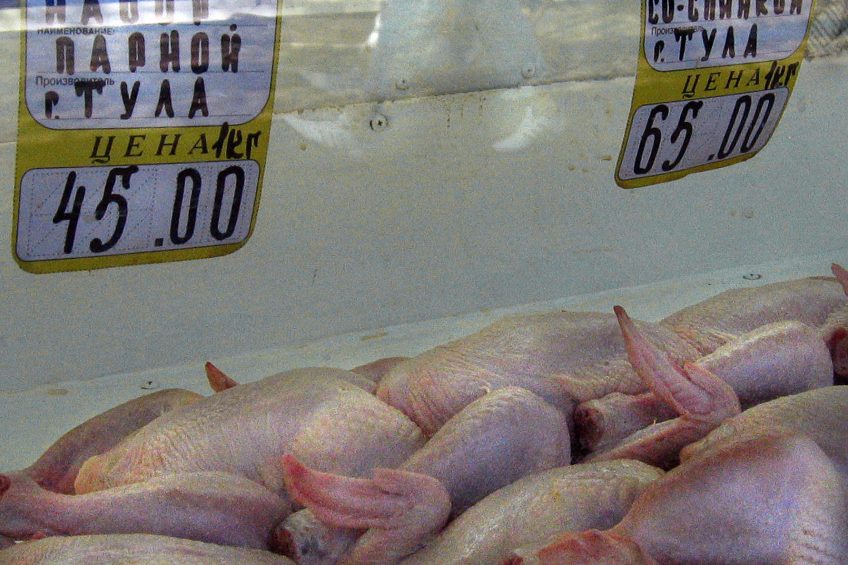Russia considering nitrofurans ban in poultry feed

Nearly 50% of chicken meat on Russia’s grocery shelves is contaminated with nitrofurans; a study of Russia’s Quality Agency (Roskachestvo) has shown. In order to protect the health of consumers, this use of this group of antibiotics should be fully banned in poultry feed, the agency now claims.
Roskachestvo has already submitted this proposal to Russia’s veterinary regulator Rosselhoznadzor.
Nitrofurans in various poultry samples
In total Roskachestvo has studied 21 samples of chicken of various producers in early 2017, saying that nitrofurans have been detected including in the poultry meat of the country’s leading manufacturers. The organisation, however, has not unveiled the names of companies which have been found using these substances.
At the moment, the technical regulation on feed and feed additives, which sets the norms of feeding in Russia, Belarus and Kazakhstan, does not mention nitrofurans at all, so in fact there are no limits for use of these drugs in poultry feed, Roskachestvo stated. In addition to nitrofurans, the research also identified the presence of quinolones and anticoccidials in some samples of poultry.
Use of nitrofurans not illegal
In fact, manufacturers who produced poultry contaminated with these drugs have not violated any rules of Customs Union or Russia, but at the same time this product is not deemed beneficial for the health of consumers, Roskachestvo emphasised.
Within the study, the organisation detected residues of tetracycline antibiotics in 10% of poultry, while in total 20% of studied samples were recognised as violating veterinary rules. As a result, according to Roskachestvo’s experts the share of good quality poultry at Russia’s grocery shelves is currently only slightly above 30%, Marta Galicheva, Roskachestvo’s press-secretary estimated.
Also interesting: In-feed antibiotics still used in Russian poultry
Banned in many foreign markets
Nitrofuran use in poultry is banned in many foreign markets, including the European Union, so the practice of using these drugs in Russia’s poultry farming could hamper the industry’s export potential, Roskachestvo warned, saying that, in general, nitrofurans are the cheapest type of feed antibiotic in the country, but still they can be replaced with some alternative drugs.
In a press-release, Rosselhoznadzor said that it is closely monitoring the situation on quality of Russia’s poultry and is in constant contact with Roskachestvo on the issue. In addition, the regulator confirmed it is considering the proposal of introducing a full ban of nitrofurans in poultry feed, but did not say when the decision on this matter might be taken.
Pressure from other poultry markets
At the same time, Russia’s market participants suggested to not hurry with introducing restrictions on feed antibiotics. Sergey Yushin, the head of National Meat Association, said that such a step requires a strong scientific base, as “introducing a ban on these drugs simply because they are not allowed in the European Union and the US is wrong, because in Russia some veterinary rules are often used not to protect consumer health, but as trade barriers”.
Roskachestvo was established in 2015 by Russia’s government, as a state-owned agency for promoting well-quality domestic production both in domestic and foreign markets.













